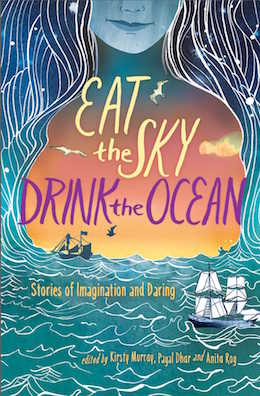Eat the Sky, Drink the Ocean (edited by Kirsty Murray, Payal Dhar, and Anita Roy) is a collection of collaborative works between Australian and Indian creators—artists and writers both—inspired by feminist principles and the global struggle of girls in patriarchy. As the introduction notes, brutal crimes against young women in late 2012 in both countries sparked protest and activism; the world took notice, too. The anthology was born out of these conversations about “the fate of all young women,” and as the title emphasizes, it is about “impossibilities, dreams, ambitions and a connection to something larger than humanity alone.”
The notable thing about this collection for young readers isn’t just that it came out of feminist principles, but also that it’s doing something I don’t see often at all: pairing up creators from different fields and cultures to create collaborative stories based on the theme. It creates a unique tone in the anthology, wherein it seems clear that everyone is experimenting and playing off of one another. In a sense, it reads more like an art project than a short story collection.
This is in part because the pieces are mostly brief, in some cases close to being flash-fiction, so they move quickly from one to another and focus for the most part on one image or concept. This makes for a fast read that primarily skims the surface of its theme rather than digging in deep. It’s a bit like watching a flipbook or a set of flashcards of intriguing concepts and singular moments—it provokes bursts of investment and emotional insight, fast then done, and stacks those all up back to back to create one fairly seamless whole.
It’s fascinating, to be honest, though I’m not sure it’s objectively comparable to the majority of the anthologies I’ve read recently. On a story-by-story basis, I often found myself feeling like I’d barely taken a sip before moving on to something else. The one unfortunate side effect of this rapid-fire organization, which is engaging as a conceptual whole, is that the individual stories—considered as separate pieces with their own space to breathe—are often lacking depth. There’s simply not room to dig in and explore; there’s only room to give us one idea, one moment, one thought, before it’s over.
Some of the contributors do better with this limitation than others. “What a Stone Can’t Feel” by Penni Russon is effective in its exploration of the strength of bonds between young women and the unfairness of suffering and loss, while also presenting an intriguing speculative conceit (the protagonist can enter into other objects to become part of them). “Arctic Light” by Vandana Singh also manages to encompass the complexity of a young woman’s choice to join an environmental direct action team and her subsequent arrest and imprisonment in a remarkably short space. Samhita Arni’s “Cast Out” takes on familiar themes in feminist criticism: girls cast out for their magical ability, which is prized in boys, forming their own culture and safe space then seeking to gift it to other girls. (It reminds me of Maresi, a feminist young adult novel I reviewed recently here.) The opening story, “Cat Calls” by Margo Lanagan, is also charming and speaks rather directly to the theme of the anthology: a group of girls and boys banding together to address and stop street harassment.
Others, though, are either too short or too predictable to quite work for me. “The Runners” by Isobelle Carmody and Prabha Mallya doesn’t succeed with its cloyingly obvious parable about a matriarchy and its treatment of android men. “Cool” by Manjula Padmanabhan took up too much of its limited space with exposition and then took a strange turn into the boy protagonist wanting to dance with his virtual teacher—but nothing else happens, and it ends abruptly. I also found “Back Stage Pass” by Nicki Greenberg too over-played to coax much of a response from the reader, which is an unfortunate note to end the collection on.
Overall, it’s an interesting project that works better taken as one giant art project—collaborative, global, and intersectional—than it does as a short story collection. I adore the concept and the motive, but I’d have liked to have seen a more solid collection of individual parts as well. It might have given the final product a stronger showing, though it stands up fine on its own in the end. There could always use to be more diverse and feminist stories for young readers, though, so it’s a definite success in that category as well.
Eat the Sky, Drink the Ocean is available March 7th from Simon & Schuster.
Lee Mandelo is a writer, critic, and editor whose primary fields of interest are speculative fiction and queer literature, especially when the two coincide. They have two books out, Beyond Binary: Genderqueer and Sexually Fluid Speculative Fiction and We Wuz Pushed: On Joanna Russ and Radical Truth-telling, and in the past have edited for publications like Strange Horizons Magazine. Other work has been featured in magazines such as Stone Telling, Clarkesworld, Apex, and Ideomancer.











Sounds good. Why the title?